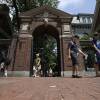When you think of essential workers, you probably don’t think of people wearing lab coats. Yet if biotech researchers stay home, the losses are huge. Consider for instance the value of just one lab dish: $30,000.
Steve Perrin, the CEO of ALS Therapy Development Institute, said the research is time-sensitive. Someone has to guide it to the next step, regardless of the weather.
"What you can’t change is the fact that experiments tend to be long term," said Perrin. "Once they’re set up, if somebody's not coming in to keep the next set of experiments going for that objective, it’s an incredible loss in not only time, which is incredibly important in an ALS patient's life, but money that went into experiment to begin with. You could be looking at tens of thousand of dollars."
In Kendall Square in Cambridge, and in other local communities, biotech companies also run round-the-clock manufacturing operations.
"You can’t just flick a switch and say, well, we’re done for the day," said Massachusetts Biotechnology Council's Peter Abair. "You have to sustain that process or you lose that entire batch, which is incredibly expensive to the manufacturer. So you need people to help sustain that activity, through whatever natural calamity might be happening."
Biotech jobs support an annual payroll in Massachusetts worth $6.5 billion dollars. Many of the biotech headquarters here are global giants, but there are startups, too. And snow doesn’t help the bottom line.
"They’re venture backed, angel backed in terms of financing," said Adair. "They might be boot-strapped, friends-and-family-funded, that sort of thing, so every day that they’re not pushing the science forward is a day that is costing them money and costing them resources and might impact their research in the long term."
At ALS Therapy Development Institute, Perrin said he stopped sending email telling essential workers to show up because he doesn’t need to. Many in the lab are motivated by personal connections to people battling ALS, a devastating disease without an effective treatment.
"I don’t have it half as bad as an ALS patients does," said Perrin, "and therefore you trudge in, you get over the fact that you're already tired from shoveling snow, and you get in here, and you do your job, because every day is that precious for a patient that has this disease."
It's a reality that puts the six feet of snow that’s fallen in Kendall Square this past month in perspective.




